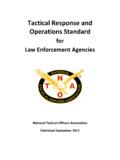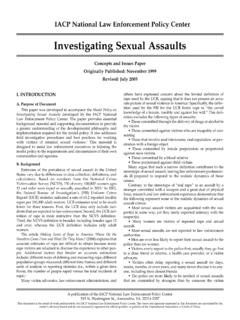Transcription of THE PSYCHOLOGICAL FITNESS-FOR-DUTY …
1 THE PSYCHOLOGICAL FITNESS-FOR-DUTY EVALUATION: WHAT EVERY police OFFICER SHOULD KNOW Laurence Miller, PhD You ve been referred for a PSYCHOLOGICAL FITNESS-FOR-DUTY (FFD) evaluation. You re not happy about it. You don t know what to expect and you re not sure what the results will mean for your career. Although you should be cautious and concerned, there s no need for anger or panic. If carried out correctly, the PSYCHOLOGICAL FFD need not be unnecessarily adversarial or demoralizing. On the other hand, this kind of evaluation should not be taken lightly because the results of an FFD may be brought before a court or a governmental commission and your entire career may hinge on the FFD s conclusions. To make some sense of this process, here are some things that you, your referring supervisor, and the examining psychologist should all know.
2 REASONS FOR A PSYCHOLOGICAL FFD If you injure your knee or develop high blood pressure, this may affect your ability to perform your job as a law enforcement officer. Or it may not. If a supervisor or commanding officer has reason to believe that your limp or frequent headaches are interfering with your job performance, he or she may recommend you seek medical attention. If the problem persists, you may be referred for a medical FFD. The examining doc may declare you medically fit to return to duty ; recommend a course of treatment that will restore you to such fitness (a knee brace or surgery, antihypertensive medication or exercise); or declare you permanently unfit for duty . Similarly, in cases where it is suspected that personal traits, disorders, or stress reactions are causing or contributing to problem behavior or substandard performance, and where the usual channels of review, coaching, counseling, and discipline (see separate article) have failed to effect a substantial change, a formal PSYCHOLOGICAL fitness for duty (FFD) evaluation may be ordered to (1) determine if you are psychologically capable of remaining in your job as a police officer; (2) if not, then what measures, if any, are recommended to make you more effective and able to function up to the standards of the department; and (3) what kinds of reasonable accommodations, if any, must be in place to permit you to work in spite of residual disabilities.
3 The PSYCHOLOGICAL FFD evaluation thus combines elements of risk management, mental health intervention, labor law, and departmental discipline. In general, FFD referral questions should be as specific as possible, not: Officer Jones seems to be depressed and this is interfering with his police work, but rather: Officer Jones has been late to shift 5 times this past month, he has been observed on several occasions to be fatigued and in physical distress, as well as to behave in an absent-minded and distracted way, and there have been 3 citizen complaints of abuse of force during the past evaluation period. These represent a deterioration from previous evaluation periods and reflect a pattern of substandard performance in this agency. Upon interview, Officer Jones denies any problem.
4 Current guidelines by the International Association of Chiefs of police (IACP) require that the evaluator be a licensed psychologist or board certified psychiatrist with law enforcement experience. The guidelines, however, do not specify how much experience is sufficient and there is as yet no generally accepted formal credentialing for police psychologists as a distinct professional specialty. Thus, the level of law enforcement training and/or experience of these clinicians may vary considerably from agency to agency. THE PSYCHOLOGICAL FFD EVALUATION: DO S AND DON T S FOR OFFICERS As noted earlier, there s no way you re going to enjoy an FFD exam, but there are things you can do in order for it to go as smoothly as possible and for the results to be as accurate a representation of your true state as possible.
5 Here are some recommendations I would give you if you were coming to see me for an FFD. Don t assume the worst. I m not your enemy and, for that matter, I m not your friend either. Even if the FFD order comes in the context of a bitterly contentious departmental action, my only job is to objectively evaluate your mental status and relate it to the specific referral questions as to your fitness for duty . Know your rights and responsibilities. Not assuming the worst doesn t mean being a chump. Know what you re in for. Either through your own research or in consultation with your legal representative, make sure you know what your rights and responsibilities are with respect to the FFD exam. For example, do you know about Garrity and Lybarger? No? Look em up.
6 Again, the goal is not be overly defensive and confrontational, but to protect yourself from unwarranted actions on the examiner s part or illegitimate use of the evaluation results. Come prepared. Show up on time. If you were supposed to bring any records or materials, have them with you. Make sure you have your reading glasses. If the exam is scheduled for early afternoon, make sure you had lunch. Accordingly, I ll make sure you are seen at the appointed time and that all my materials are ready when you arrive. Read everything you sign. At the outset, there ll be a bunch of forms to sign. Read them. If you have any questions about what you re signing, let me know. Don t be afraid to ask questions. This is an extension of the above. If you have a question about something I ask you or a test I m giving, let me know.
7 A reasonable examiner won t object to reasonable questions. Bear in mind, however, that I may not be able to answer many of the questions you ask me. For example, I ll almost never be able to respond to, What s that test result mean? either because I need to score the test results against a normative table or because the actual results of the exam are owned by the department making the referral. That s their rule, not mine. I understand that may tick you off, but I have to follow my protocols, too. If I can t answer a particular question, I ll tell you I can t. Don t be intimidated. Be honest and do your best. The entire validity of the FFD evaluation hinges on the accuracy of the information I obtain. Many interview protocols and PSYCHOLOGICAL tests have controls for inconsistency and response manipulation.
8 In other words, if you re lying or faking test results, I ll probably know about it. Then, even if the rest of your profile is relatively benign, I ll have no choice but to report that you lied, and how do you think that s going to look? So do us both a favor: Tell the truth and do your best job on the tests. Expect to be treated courteously and behave accordingly. Even though I m not your enemy or your friend, you should expect me to behave professionally. I should not demean or humiliate you and, even though I may have to ask you some tough questions, you shouldn t have to feel like a criminal suspect. Remember, the more comfortable you feel during the examination, the better your memory will be and the more accurate will be the information I get.
9 So I have nothing to gain by trying to make you squirm. By the same token, I ask that you try not to bust my chops more than necessary. I understand that you don t want to be here and I also understand that you ve had a whole life and career outside the narrow confines of this FFD case. You re a professional and so am I; we both have a job to do so let s do it. THE PSYCHOLOGICAL FFD REPORT Ultimately, the examiner will prepare a report that will almost always first go to the referring agency. Again, there is no single universally format for such reports. However, in their comprehensive volume on the subject, A Handbook for PSYCHOLOGICAL FITNESS-FOR-DUTY Evaluations in Law Enforcement, Rostow & Davis (2004) provide a useful and practical format for PSYCHOLOGICAL FFD evaluation reports, which I outline here along with my own comments and suggestions.
10 The exact style and content of the report may vary according to the needs and preferences of the individual psychologist and police agency, but should contain the following basic elements: Identifying data. The officer s name, identifying demographics, departmental referral identification, name of the evaluator, and dates of the evaluation. Reason for evaluation. This describes the main incidents, issues, and referral question(s) that have led the officer to the psychologist s office. Although a wide range of data may be relevant to the individual s overall PSYCHOLOGICAL functioning, as noted above, the focus of the evaluation itself should be relatively specific to the question at hand. Sometimes, officers are referred without clear indications for why an FFD evaluation is being ordered ( He s got an attitude problem ).





